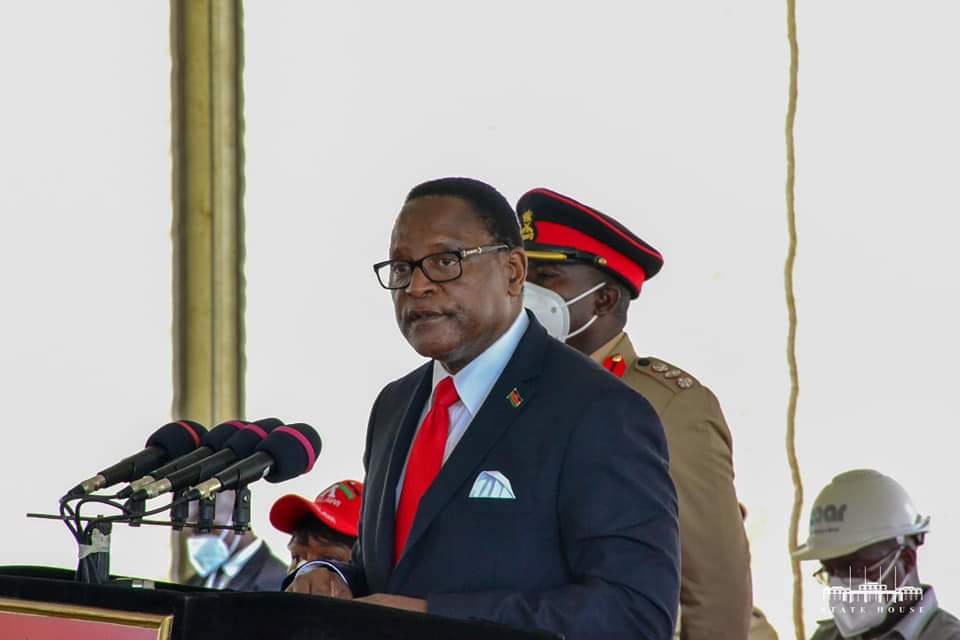Chakwera set to meet fertiliser makers
President Lazarus Chakwera is set to meet fertiliser manufacturers and other stakeholders following a sharp rise in fertiliser prices, the State House Press Office has said.
Speaking during the fortnightly State House Media Briefing yesterday in Lilongwe, State House director of communications Sean Kampondeni said the President is concerned about the development which he described as a blow to farmers in the country.

He said: “The President is genuinely concerned about rising prices of fertiliser granted that the problem is partly attributed to global factors in the economy because fertiliser production globally dropped and there is low supply which is increasing demand, leading to price rises.
“The President is keen to work in partnership with those who supply fertilisers here in Malawi to find win-win solutions because ultimately the ones who are
going to use fertilisers are farmers and the prices may be seen by farmers to be draconian but the President is working on resolving the issue.”
Fertiliser prices have sharply increased to between K35 000 and K40 000 per 50 kilogramme (kg) bag, up from last season’s pricing of K22 000 to K25 000 per 50 kg bag.
In a written response yesterday, Fertiliser Association of Malawi chief executive officer Mbawaka Phiri attributed the spike in fertiliser prices to international prices that have gone up.
She said the developments on the international market, is a result of increased cost of raw materials, manufacturing and logistical bottlenecks due to Covid-19, oil and gas price increases and increased product demand.
Phiri said: “In the context of Malawi, the above coupled with the depreciation of the kwacha to the dollar results in rising fertiliser prices. Ultimately the cause of the price increase is beyond our control.
“Supplies in Malawi will be dependent on availability of the foreign exchange which is used to import fertiliser and as we know forex has been scarce in the past few months, such that many of our member companies have been unable to access it lately.”
She warned that if companies are unable to access financing in form of foreign currency, supply will be negatively affected.
The development comes at a time Malawi had a bumper yield in excess of one million tonnes of maize, but with this development farmers are predicting a worst season ahead if nothing is done.
Farmers Union of Malawi president Frighton Njolomole in an interview yesterday described the increase of the commodity as a big blow to small-scale farmers who cannot afford fertiliser at K40 000 a bag.
He said what this means is that the country will face hunger next year as as a majority of farmers will not access fertiliser.
Njolomole said: “It is worrisome and sad to see prices of fertiliser rising beyond the reach of majority of our farmers. Even commercial farmers will be hit hard and if they will not afford, they will scale down production on farms.
“With this development, we foresee hunger looming in the country next year if price mitigation measures will not be employed, nobody will survive to invest more in farming given prevailing prohibitive fertiliser prices”.
A World Bank Brief on the current rising fertiliser prices attributes it to strong demand from key crop-growing regions that have been the driving force behind high fertiliser prices; hence, predicting high fertiliser prices in the remainder of 2021.
It says agriculture commodity prices, such as corn and soyabeans, have rallied amid tighter supplies and strong demand and that higher farm revenue has increased crop acreage and application rates of key nutrients like phosphates and potash.
The brief states that fertiliser prices have also been bolstered by higher input costs, such as phosphates raw material costs, particularly sulphur and ammonia, which have increased sharply as refinery curtailments due to Covid-19 restrictions limited supplies.
“Although there is ample capacity to respond to strong demand, it may take some time to ramp up output, which could provide continued short-term price support,” it reads.
During its first year in office, Chakwera’s nine political-party Tonse Alliance launched an ambitious Affordable Inputs Programme which enabled 3.5 million smallholder farming households access to low cost fertiliser at K4 995 per 50 kg bag in fulfilment of the campaign promise. However, the gesture was a far cry from the initial generalised campaign promise of universal subsidy.





